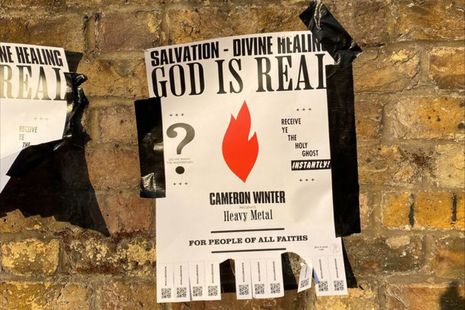A Cameron (Winter) Summer
Harmony Mitchell praises indie’s newest darling, Cameron Winter

I found Cameron Winter’s Heavy Metal at the perfect time. The summer months, I always find, evoke this particular feeling: that of slow, expansive days with very little to do. Of dry heat beating down, making the postwar brutalist architecture of my hometown Plymouth appear to be sort of crumbling away. Heavy Metal perfectly encapsulates this quiet melancholic feeling – profoundly devastating yet never quite miserable, it captures the anguish and eventual acceptance of moving forward.
The first time I properly listened to the album I was working in Oxford for a summer job. I finally had some time off on a beautiful bright day, perfect for meandering around an old city. Beginning with bookshops, Blackwells, and that one five-pound store, I then wandered by the old monuments, colleges, the evil Pret location which is somehow a 15th century building. With nothing left to explore, I settled in a café on Broad Street – which for whatever reason reminded me of King’s Parade – and selected Heavy Metal from my to-listen list.
Prior to this release, Cameron Winter was known as frontman of Brooklyn band, Geese, who write a spirited and enjoyably weird combination of psychedelic/country/rock. Having released two studio albums – as well as single ‘Taxes’ which is something of a modern indie classic – they are anticipating forthcoming album ‘Getting Killed’ later this month. They are the music-magazine-sweetheart type of band – their music is certainly fresh, bold, and fun. Yet, to me, Winter’s solo debut exceeded Geese in terms of its timelessness and lyrical depth.
I have to admit that, despite having enjoyed ‘Love Takes Miles’ at the recommendation of my dear friend Orla, I put off listening to the full album for some months. Something about the chains and colour palette of the cover made me anticipate something edgy bedroom pop adjacent. Upon giving it a chance, however, I found Heavy Metal to have that rare quality of being immediately brilliant. It is decisively an album rather than a mere set of songs, with frequent self-referential remarks (“Nina knows why”/ “I’m a $0 man”) and tracks which, while diverse, build and cohere beautifully. Heavy Metal doesn’t spell out a narrative story. Instead, we are exposed to absurd and colourful glimpses: failure, God, walking and walking, feet, babies, money. But Winter’s trembling vocals have that convincing wholeness which leaves you in complete understanding, even where descriptions are dense and otherworldly.
“We are exposed to absurd and colourful glimpses: failure, God, walking and walking, feet, babies, money”
The album opens with ‘the Rolling Stones’, a Nick Cave reminiscent track about creating itself. Probably the most narrative song, the verses present sharp and frustrated metaphors about breaking cups, burning trash, pounding a masterpiece. The uneasy relief of the chorus sees Winter relaying bizarre instances of creative failure – Brian Jones’ untimely drowning, John Hinkley Jr.’s failed assassination of Reagan (“I was born to dance/With a candy gun/Towards the president’s ass”). All the while the acoustic guitar swirls in this enveloping lull, bringing to mind an old favourite of mine, Plas Teg’s ‘Redwood Reverie’.
‘Love Takes Miles’, the next highlight, is pretty much everything a pop song should be. The mundane and the absolute coalesce in quite a lovely way, with musings on his lover’s feet immediately followed by those as grand as “I need somebody sent down from the sun/ that talks to me how you used to”. This slight stinging edge is complimented by the airiness of the chorus, which returns to these universal images of bells, light, and of course the titular proclamation on love.
Immediately following this is the enormity of ‘Drinking Age’. Upon showing this one to my Grandad, Bob Dylan supremacist who rarely concedes to liking new artists, he suggested I review it as a “musical landscape of broken sounds”, and, honestly, I quite agree. The piano creates a sudden deepening, with Winter’s initially measured and minimal vocals swelling into this raw agonised sound, resembling PJ Harvey’s tormented wail in ‘Legs’.

Two bouncier tracks build anticipation before we reach the album’s cathartic masterpiece, ‘Nina + Field of Cops’. At this point I am filled with awe and envy that a 22-year-old is capable of summoning such a rich lyrical and instrumental landscape. Although meticulously crafted, this track feels like unconstrained consciousness hopelessly spilling out, consuming you with floods of colours, the jittery instrumental, lines that shine out at you – “One of the important people standing on your chest/ I’ll love whatever kicks me hardest in the mouth”. This song is the most vibrant and devastating I have heard in a while.
“It makes almost no sense but is unequivocally beautiful”
A wavering, unsettling wail, followed by the return of the piano, introduces $0, which feels like a quiet reflection on what has just been. The sound thickens, grows murkier; Winter’s characteristic strange sounds whirl on top of simple but brutal lyric “you make me feel like a dollar in your hand”. Then, perhaps my favourite moment of the album, Winter’s spontaneous declaration: “God is real, God is real, I’m not kidding God is actually real”. It makes almost no sense but is unequivocally beautiful. It gives you that lurching feeling of finding something out that makes your stomach drop, combined with the tranquillity of staring into a field full of wildflowers on a beautiful evening.
The album ends with Winter’s favourite thing – walking. The murky layers have subsided to reveal a single guitar strumming brightly, as if to remind us that we ‘Can’t keep anything’; the most profound experiences are, too, transitory.
 News / Hundreds of Cambridge academics demand vote on fate of vet course20 February 2026
News / Hundreds of Cambridge academics demand vote on fate of vet course20 February 2026 News / Judge Business School advisor resigns over Epstein and Andrew links18 February 2026
News / Judge Business School advisor resigns over Epstein and Andrew links18 February 2026 News / University Council rescinds University Centre membership20 February 2026
News / University Council rescinds University Centre membership20 February 2026 News / Petition demands University reverse decision on vegan menu20 February 2026
News / Petition demands University reverse decision on vegan menu20 February 2026 News / Caius students fail to pass Pride flag proposal20 February 2026
News / Caius students fail to pass Pride flag proposal20 February 2026










